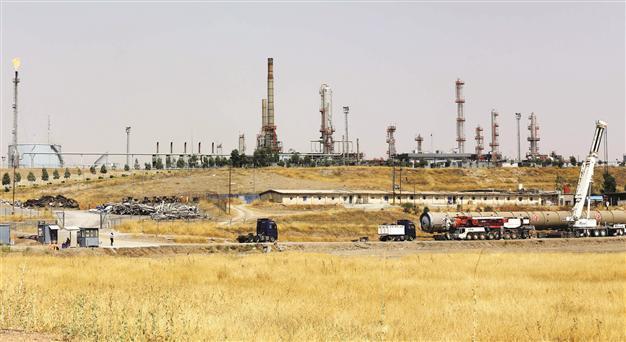Iraqi Kurds begin oil pumping from Kirkuk
DUBAI - Reuters
 Iraq’s autonomous Kurdish region has begun to pump oil from Kirkuk fields previously controlled by Iraq’s central government into the pipeline system that runs in its own territory, a senior Iraqi oil official said on July 17.
Iraq’s autonomous Kurdish region has begun to pump oil from Kirkuk fields previously controlled by Iraq’s central government into the pipeline system that runs in its own territory, a senior Iraqi oil official said on July 17. Kirkuk lies on the disputed boundary between the northern Kurdish region and the rest of Iraq and is at the heart of a long-running dispute between Baghdad and Arbil, the Kurdish regional capital, over territory and natural resources.
Kurdish forces took control of production facilities at the Kirkuk and Bai Hassan northern fields on July 11, exploiting a power vacuum created by an Iraqi military withdrawal in the face of an Islamist insurgent offensive.
Around 20,00 bpd
The Iraqi official told Reuters by telephone from Baghdad the Kurdish region had started to pump crude from one of the Kirkuk domes to the Khurmala dome, out of which the Kurdish pipeline runs, using an existing connection.
“They are using a pipeline which was originally used to send crude from [Kurdish region], but they have now reversed it [to use it by the Kurdish region],” the official said, estimating the quantity at
around 20,000-25,000 barrels of oil per day.
The Kurdish Ministry of Natural Resources could not immediately be reached for comment.
Kirkuk’s Baba and Avana geological formations were previously administered by Baghdad before the July 11 takeover. The Kirkuk region’s third formation, Khurmala, has long been under the control of the Kurdistan Regional Government (KRG).
Kurdish forces took control of Kirkuk a month ago, making good on a longtime territorial claim to the city, after Iraqi troops left in the face of a lightning assault by Islamic State insurgents, who have seized large parts of northern and western Iraq, but not threatened well-defended Iraqi Kurdistan.
The Kirkuk and Bai Hassan oilfields have a combined production capacity of 450,000 bpd but have not been producing significant volumes since March, when Iraq’s Kirkuk-Ceyhan export pipeline was sabotaged by Islamist militants.
Last year, Baghdad signed a deal for BP BP.L to revive the Kirkuk oilfield, a plan that the KRG has rejected as illegal.
















